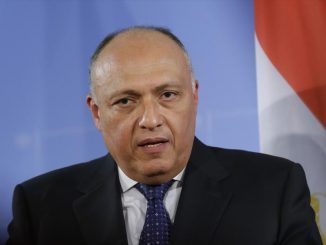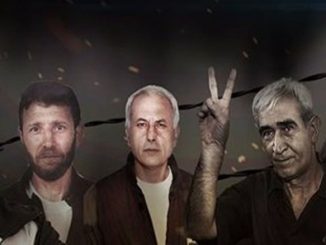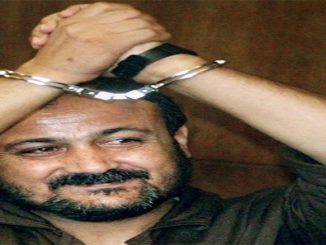
Human Rights Watch has released a report titled:”We are in Tombs:Abuses in Egypt’s Scorpion Prison” which highlights how the Egyptian authorities routinely abuse inmates in ways that may have contributed to the death of some of them.
The notorious Scorpion Prison which is known as the “Scorpion Cemetery” is a maximum security prison in Cairo that holds many political prisoners
According to the 80-page report, “Staff at Scorpion Prison beat inmates severely, isolate them in cramped “discipline” cells, cut off access to families and lawyers, and interfere with medical treatment.”
In addition, prisoners are treated by the officers of Egypt’s Interior Ministry in a cruel and inhuman way that probably amounts to torture in some cases and violates basic international norms for the treatment of prisoners.
The abuse in Scorpion, where inmates are held in cells without beds or items for basic hygiene, has persisted with almost” no oversight from prosecutors and other watchdogs, behind a wall of secrecy kept in place by the Interior Ministry,”said the report.
Joe Stark, the deputy Middle-East and North Africa director at Human Rights Watch, said: “Scorpion Prison sits at the end of the state’s repressive pipeline, ensuring that political opponents are left with no voice and no hope.” He added,”Its purpose seems to be little more than a place to throw government critics and forget them.”
Human Rights Watch interviewed 20 relatives of inmates held in Scorpion, two lawyers, and one former prisoner, and reviewed medical files and photos of sick and deceased prisoners.
Relatives stated that conditions in Scorpion deteriorated drastically in March 2015, when Magdy Abd al-Ghaffar was appointed by al-Sisi as interior minister. Between March and August 2015, Interior Ministry officials “banned all visits by families and lawyers, essentially cutting off the prison from the outside world.”
As a result of the ban decision, the families were prevented from “delivering much-needed food and medicine otherwise unavailable in the prison – where there is no hospital or regular visits from a doctor – and amounted to what relatives described as a “starvation” policy that left inmates sick and gaunt,reported HRW.
Accordingly, at least six Scorpion inmates died in custody between May and October 2015. Three of their families agreed to speak with Human Rights Watch. According to HRW,”Two of the men had been diagnosed with cancer and one with diabetes. Their relatives said that the authorities prevented the men from receiving timely treatment or medicine deliveries, refused to consider conditionally releasing them on medical grounds, and failed to investigate their deaths.”
The report mentioned one case of Essam Derbala, a high-ranking member of al-Gama`a al-Islamiyya (the Islamic Group); the Interior Ministry authorities refused to provide him with his prescription diabetes medicine, despite orders from a judge and prosecutor, Derbala’s brother and lawyer said.
The authorities refused to provide his medicine even after Derbala appeared at an August 2015 court hearing shaking, semi-conscious, and unable to control his urination. Derbala died hours after the hearing.
Another detainee, Farid Ismail, a former member of parliament for the Muslim Brotherhood’s Freedom and Justice Party, suffered from Hepatitis C and died in May 2015, after passing out in a hepatic coma inside the prison.
According to Aisha al-Shater, the daughter of Muslim Brotherhood deputy supreme guide Khairat al-Shater, when Ismail failed to answer a daily roll call devised by her father and others in the cell block during a period when they were confined to their cells, they told the guards, who said that it was “none of their business.” The next day, guards discovered Ismail unconscious in his cell. He died in an outside hospital about a week later.
Aisha al-Shater said, “Afterward, even calling to each other was prohibited.” She said, “So right now, they say, ‘We are in tombs. We’re living, but we are in tombs.’”
Since the months-long visit ban in 2015, the Egyptian authorities at Scorpion “have continued to arbitrarily ban inmates from meeting their families or lawyers for weeks or months. They do not allow inmates to meet privately with their lawyers at any time. Officers, including some high-ranking Interior Ministry officials, have beaten and threatened inmates who went on hunger strike to protest conditions and humiliated and mistreated prominent prisoners during cell searches,”as stated by the report.
Since the military coup in June 2013 till May 2014, Egyptian authorities arrested or charged at least 41,000 people, and 26,000 more may have been arrested since the beginning of 2015, according to lawyers and human rights researchers. The government has admitted to making nearly 34,000 arrests.
In fact, serious alleged abuses against detainees have become a common phenomenon in Egypt’s prisons, however, Scorpion has emerged, not for the first time in its history, as the central site for those deemed the most dangerous enemies of the state.
According to the decree that established the prison constructed in 1993 and officially known as Tora Maximum Security Prison, Scorpion was intended to hold “preventive detainees in state security cases.”
Major General Ibrahim Abd al-Ghaffar, a former Scorpion warden, said during a television interview in 2012 ,“It was designed so that those who go in don’t come out again unless dead,” he added,“It was designed for political prisoners.”
Scorpion prison is run by the National Security Agency of the Interior Ministry, then known as State Security Investigations, with extrajudicial authority, ignoring scores of court orders to lift arbitrary bans on access.
Scorpion prison holds about 1,000 prisoners, relatives estimate. They include most of the Muslim Brotherhood’s top leadership, alleged members of the Islamic State extremist group, and various critics of al-Sisi’s government, including journalists and doctors.
In the end, Human Rights Watch called “Egypt’s Interior Ministry should immediately end arbitrary visit bans, ensure regular access to doctors and medical treatment, and provide prisoners with minimum necessities for hygiene and comfort. ” It also called the Egyptian government to allow international detention monitors to visit Scorpion, and form an independent national committee with the authority to make snap visits to prisons and other detention sites and submit complaints to a special prosecutor.
Moreover, “The Egyptian public prosecution should investigate deaths in custody and charge those with command responsibility for Scorpion in connection with any acts of torture and cruel and inhuman treatment,”said the HRW.
Stork said,”Egypt’s detention system is overflowing with critics of the government.” He added,”Ending the abuses at Scorpion is a small step toward improving dire conditions across the country.”
Since July 2013 when Abdel Fattah al-Sisi led a military coup against Mohamed Morsi- the country’s first democratically elected president and a high-ranking Muslim Brotherhood member, “the Egyptian authorities have engaged in one of the widest arrest campaigns in the country’s modern history, targeting a broad spectrum of political opponents.”



